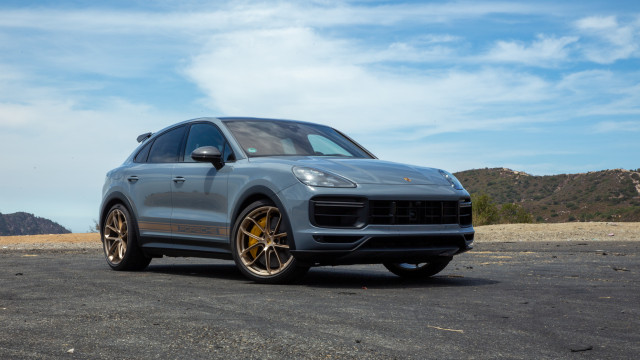


This edition of the Ford XL XL Fastback 427 is the 3 speed / Auto version and was first brought out in 1968. This was at around the same time as the introduction of the 1969 McLaren M6 GT 5.7 V8 and the 1969 Ford Mustang Boss 429.This particular Ford XL has a 6964cc Naturally Aspirated Petrol powerplant with 8 cylinders in a V formation.
The XL shares its Petrol V8 engine configuration with the likes of the 2023 Dodge Challenger SRT Demon 170 and the 2023 Ferrari SF 90 XX Spider 4.0 V8 Turbo. If you're looking for other fast cars which share the XL's Rear Wheel Drive, Saloon combination then how about the 1982 Fiat X1/9 1.5 8V or the 1965 Aston-Martin DB6 1965.
Weighing in at 1859 kgs (4098 lbs) this makes the Ford XL XL Fastback 427 in the same weight category as the 2023 Chevrolet Camaro ZL1 6.2 V8 Convertible or the give or take 50kg.
![Lotus Emira First Edition 3.5 V6 Supercharged - [2022] image Lotus Emira First Edition 3.5 V6 Supercharged - [2022] image](/editionimages/2279.jpg)
The Ford XL shares the same bhp with the 2022 Lotus Emira First Edition 3.5 V6 Supercharged (395 bhp)
In terms of power the 6964cc 16V V8 engine produces 395 bhp (294 kW) @ 5600 rpm similar to the 2022 Lotus Emira First Edition 3.5 V6 Supercharged (395 bhp) or the 2022 Lotus Emira First Edition 3.5 V6 Supercharged Auto (395 bhp).
The Naturally Aspirated V8 throws out 460 lb-ft (623.6 Nm) @ 3200 rpm placing it with cars of similar torque performance figures such as the 2024 Chevrolet Corvette E-Ray 6.2 V8 Petrol Hybrid C8 (470 lb-ft) or the 2023 Chevrolet Corvette Z06 5.5 V8 C8 (460 lb-ft).
If one combines the weight with power or torque performance for the Ford XL you can get a better idea of it's real world performance.
![Audi A4 RS4 Avant 4.2L V8 - [2012] image Audi A4 RS4 Avant 4.2L V8 - [2012] image](/editionimages/968.jpg)
The 2012 Audi A4 RS4 Avant 4.2L V8 (237.4 bhp per ton) has similar Bhp Per Ton stats as the Ford XL.
The Ford XL has a Power to weight ratio of 212.4 bhp per ton and 247.4 lb-ft per ton. Bhp Per Ton figures of the 1968 XL competing with the 2012 Audi A4 RS4 Avant 4.2L V8 (237.4 bhp per ton) or the 2014 BMW 6 Series 650 4.4 V8 (237.4 bhp per ton).
If you agree with the late great Carroll Shelby then arguably an even better indicator of potential performance, Torque. Use weight as well and you end up with - Torque per ton, with the Ford XL generating around 247.4 lb-ft per ton. If you're curious as to what other cars have as much torque to weight then look no further than the 2019 Bentley Flying Spur 6.0 W12 Twin Turbo (272.4 lb-ft per ton) or the 2022 Chevrolet Camaro SS 6.2 V8 (272.2 lb-ft per ton).
With a 0-60mph time of 6.00 secs or a 0-100km/h (0-62mph) of 6.2 secs, this made the Ford XL XL Fastback 427 as fast as the 2019 Land-Rover Defender 110 3.0 Turbo (6.00 secs) the 2017 Dodge Challenger GT 3.6 V6 AWD (6.00 secs) the 2017 Toyota Century 5.0 V8 (6.00 secs) the or the 2015 Seat Leon ST Cupra 265 DSG (6.00 secs). This Ford XL XL Fastback 427 is also faster than the 2017 Maserati Ghibli 3.0 V6 Diesel (6.10 secs) the 2017 Land-Rover Velar 3.0 SDV6 300 (6.10 secs) the 2017 Hyundai i30 N 2.0 Turbo (6.10 secs) the and the 2016 Volkswagen-VW Golf GTI 2.0 Turbo DSG (6.10 secs).
When talking about the performance of the Ford XL on the drag strip it can reach a quarter mile in an estimated 13.81 secs @ 99.0 mph. Similar performance down the quarter mile can be found with the the 2022 BMW Z4 M40i 3.0 Turbo (13.77 secs), the 1971 Maserati Bora 4.7 V8 (13.78 secs), and the 2017 Audi A6 3.0T Competition (13.78 secs).
Modern performance cars are often artificially restricted to 155mph. The 1968 version of the Ford XL XL Fastback 427 has a maximum speed of 137mph.
If maxing out your car on the AutoBahn is your thing and you're wondering what's faster than the 1968 Ford XL XL Fastback 427 then how about the 2016 Mini Cooper Clubman John Cooper Woks 2.0 Turbo (148 mph), the 2016 Mini Cooper Clubman John Cooper Works 2.0 Turbo Auto (148 mph), or the 2012 Jaguar XJ V6 (148 mph).










Porsche Cayenne GT 4.0 V8 Bi-Turbo
Engine: Bi-Turbo Petrol | 3996cc 32v V8
Top Speed: 186 mph
0-60mph: 3.10 seconds

BMW 8 Series 840Ci 4.0 V8 2d Auto
Engine: Naturally Aspirated Petrol | 3982cc 32v V8
Top Speed: 249.4 kph
0-100kph: 7.6 seconds



















